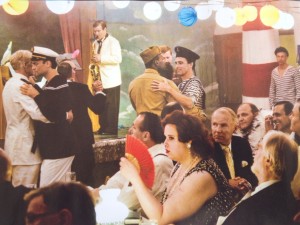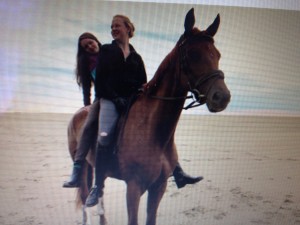Here a selection of German films at this year’s Frameline festival – all in German with English subtitles and there are more than these three that I can recommend for very different reasons. Let me start with THE CIRCLE / DER KREIS ( photo left) by Swiss director Stefan Haupt, who some of you might remember from UTOPIA BLUES, the audience favorite of the 2002 Berlin & Beyond Film Festival. Throughout his career as filmmaker, Stefan Haupt has tackled a variety of topics and genres, from music film (Utopia Blues) to documenting the phases of dying of Elisabeth Kübler-Ross who did exactly that in her groundbreaking work, and this recent docu-drama retelling a little known chapter of postwar gay history in Switzerland. Once I got over the fact that the actors did not resemble Röbi and Ernst, who lead us through the story (the actors should have been switched), I got into the captivating history of The Circle, a magazine and their subscribers so far ahead of what was happening elsewhere in gay circle in the late fifties. In Germany homosexuality was outlawed by infamous paragraph 175, in Switzerland a law against homosexuality was abolished in 1942 but around 1960, when Swiss authorities realized what THE CIRCLE subscribers in Zürich were up to, they cracked down on them and eventually drove them underground until the late 1990s. The love story between Röbi and Ernst closely attached to the ups and downs of THE CIRCLE finally comes to a happy end with gay marriage fully legalized in Switzerland in 2008.
Watching this film I was reminded of what happened in Switzerland during the second World War. The country had officially declared neutrality but Jews who thought to be save there, were shipped to the camps and neighbors reported Jews to the authorities. DAS BOOT IST VOLL, an Oscar nominated film from 1981, told the harrowing story. The Swiss seem to be more than just law abiding, they sense what it is that the authorities might object to and, being afraid of doing the wrong thing and being punished, become voluntary informers. After all, in 1943 they didn’t want Jews living next door and 20 years later they didn’t want gays as neighbors. In Germany, the situation was clear, there was a law and if you break the law you commit a crime. Paragraph 175 was abolished in 1988 and finally revoked altogether after unification in 1994.
OF HORSES AND MEN from Iceland still fresh in my memory, I was curious to see what veteran German filmmaker Monika Treut had to add to the majestic animals and their human companions. OF GIRLS AND HORSES is a different story. Horses are shown in their full glory – more so than in the Icelandic film – they are not sacrificed, they are treated with respect and love and, like in the Icelandic story, they bring about change, here to a troubled girl that, in the end, will find her calling and a new love. Shot by Birgit Möller, director of VALERIE, (winner of the Best First Feature of Berlin & Beyond 2008), the images immerse us into the green, flat, endless landscapes of north Germany. I got home sick watching the film – the horses, the colors, the horizons touching the sea, beautiful. The story of the troubled teenager being reigned in by an understanding and attractive female horse trainer didn’t touch me much, but the cinematography did.
FEUCHTGEBIETE / WETLANDS adapted from the bestselling novel by Charlotte Roche starts with a reader’s comment published by Bild online: “This book shouldn’t be read or adapted to film. It is not more than the mirror of our sad society. Life has much more to offer than the disgusting perversity of the human heart – We need God.” Touted as the craziest, most outrageous film at Sundance this year, WETLANDS will attract the unsqueamish, for sure. A teenage girl’s fascination with bodily fluids and odors leads us through vulgar anatomical explorations and sexual misadventures. Director David Wnendt picked the right face for this unusual tour de force, the innocent, cute looking Swiss actress Carla Juri. Wnendt’s first feature, the haunting neo-Nazi drama DIE KRIEGERIN /COMBAT GIRL, catapulted Alina Levshin into stardom, and rightly so. That he continued his directing career with WETLANDS came to many as a big surprise, but again, Wnendt made a big splash, only this time with very different fluids.
More to come about narrative features eligible for the Best First Feature Award — lots of great ones not to be missed.




